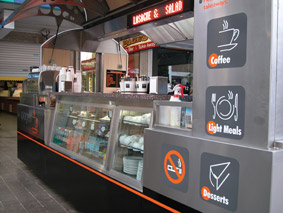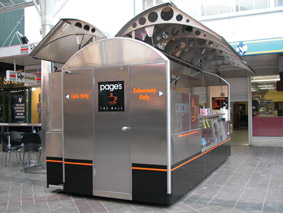
Lightweight stainless steel construction has allowed the proprietor of a Tasmanian cafe to expand operations without building new brick and mortar premises.
 Page’s of the Mall is a stainless steel satellite to an existing cafe located in the busy Launceston Mall. Custom built for the site, it has proved popular and profitable since opening shortly before Christmas 2002.
Page’s of the Mall is a stainless steel satellite to an existing cafe located in the busy Launceston Mall. Custom built for the site, it has proved popular and profitable since opening shortly before Christmas 2002.
The client, Mark Page, approached Launceston fabricator FAME Foley Industries with a particular brief: to construct a portable cafe catering to both take-away and sit-down trade which met standard refrigeration, food preparation and hygiene requirements. The unit had to conform to local Council guidelines and match the awnings recently installed in the Mall.
PACK UP AND MOVE
The challenge was to produce a design measuring just 2m high by 1.9m wide and 5.5m long to be wheeled into Page’s main shop at night.
The design evolved over the course of a year with input from a Launceston Council architect and took two months to build. The unit unpacks to a height of 2.5m when the roof is unfolded forming wing-like canopies above the serving areas, and the sides open out to 2.8m in width.
Concealed wheels at one end allow the unit to be moved using an electric pallet lifter. It is positioned over a pit with access via a hatch to water, power and drainage.
A seating area is enclosed by stainless steel barriers clad with laminex signs arranged in a zig zag shape for strength. These are also completely portable and have lockable castors.
Inside the cafe, which has garnered the nickname ‘coffee tram’, stainless steel pie heaters, fridges and washing facilities are built in as integral parts of the unit. Fully enclosed stainless steel trolleys are used to transport supplies from the main cafe.
 PRACTICAL AND ECONOMICAL
PRACTICAL AND ECONOMICAL
Stainless steel was chosen for the project both for its clean style and for its appropriateness to the design and usage. The construction is simultaneously lightweight and strong, allowing it to be wheeled around daily and to withstand the mall traffic. Hygiene is readily maintained with easy to clean food preparation surfaces.
Most of the unit, including framework, walls, benches and supports are made from grade 304 stainless while grade 316 is used for the roof as it is exposed to the weather. The fridges, part of Foley’s range of kitchen and bathroom ware, are made from grade 430. Stainless steel was supplied by ASSDA member Atlas Steels.
Costs compare favourably with erecting a permanent building, at around $100,000 to construct and fit out, and the concept can be adapted to suit other locations.
The article featured in Australian Stainless Issue 24 - March 2003